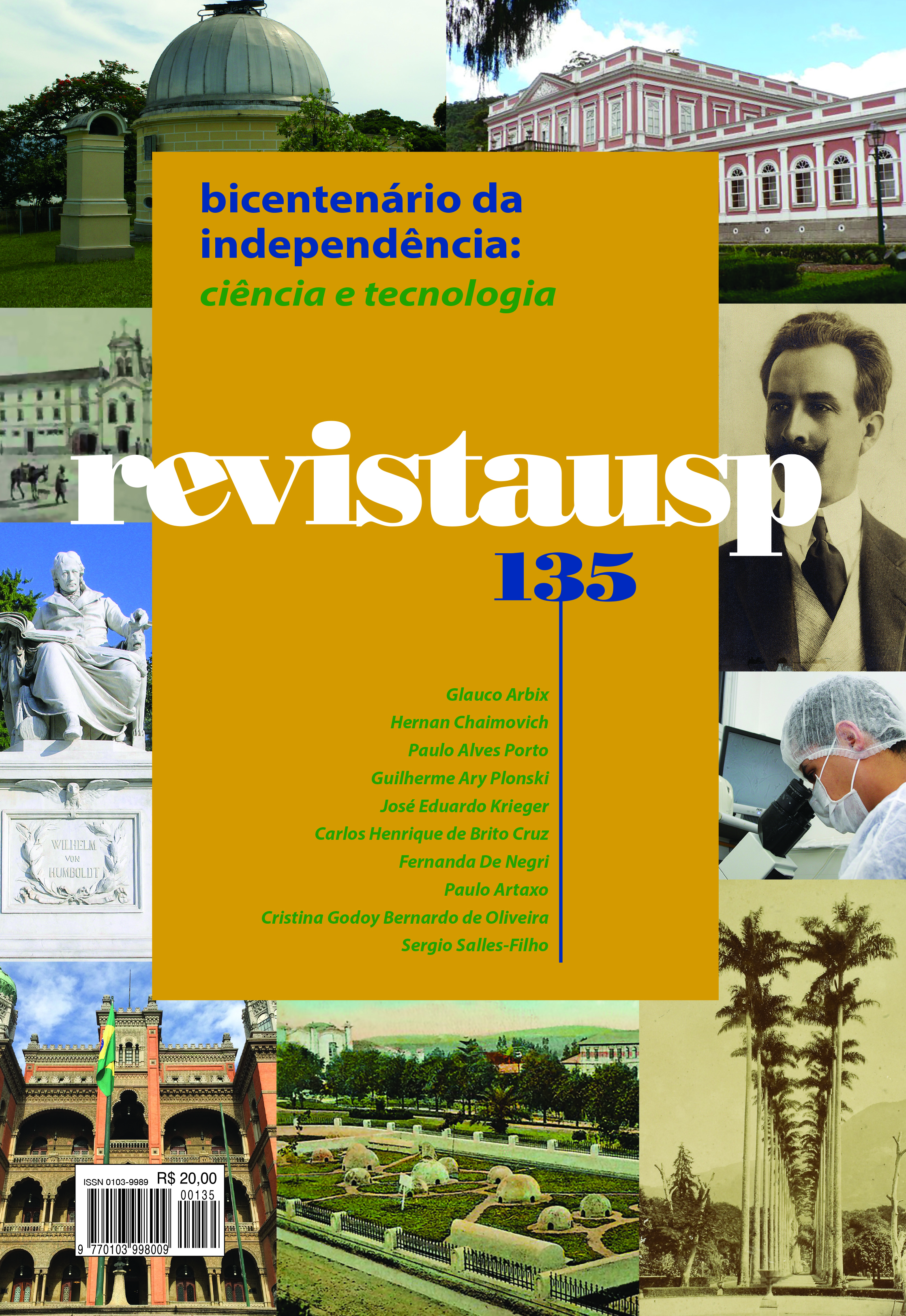Governança e prioridades da ciência brasileira
DOI:
https://doi.org/10.11606/issn.2316-9036.i135p163-182Palavras-chave:
governança da ciência, indicadores de qualidade, engajamento socialResumo
O objetivo deste artigo é apresentar e discutir a governança da ciência, o que ela engloba e quais os desafios que hoje são mais importantes em âmbitos nacional e global. O tema é abordado sob duas dimensões: governança estrita, que examina os cânones internos do funcionamento da ciência; e governança ampliada, que olha para as interfaces e interações da ciência com a sociedade. Sobretudo, discute-se o que está mudando nessas dimensões e quais os impactos e iniciativas sobre as “instituições da ciência”. Temas como ciência aberta, vieses de priorização e seleção, indicadores de qualidade, engajamento social, pesquisa orientada a missão, dentre outros, são discutidos como “espírito do tempo” e seus efeitos – de mão dupla – sobre a governança estrita e ampliada da ciência. Essa discussão é estendida para o Brasil em seus 200 anos de Independência, colocando alguns dos desafios que teremos que enfrentar.
Downloads
Referências
ANLI, Z.; BERGMANS, J.; WEIJDEN, I. Van Der. Career pathways in research : the current data landscape, 8, 2022 (https://doi.org/10.6084/m9.figshare.19609512).
BALBACHEVSKY, E. “Governança na pesquisa científica: reflexões sobre a prática da pesquisa contemporânea e a experiência brasileira”. Sociologias, 19 (46), 2017, pp. 76-101.
CARAYANNIS, E. G.; CAMPBELL, D. F. J. “Smart quintuple helix innovation systems”. Springer, 2019 (https://doi.org/10.1007/978-3-030-01517-6).
CONCEIÇÃO, C. P. et al. “European action plans for science-society relations: changing buzzwords, changing the agenda”. Minerva, 58 (1), 2020, pp. 1-24.
COSENS, B. et al. “Governing complexity: integrating science, governance, and law to manage accelerating change in the globalized commons”. Proceedings of the National Academy of Sciences of the United States of America, 118 (36), 2021, pp. 1-9.
CURRY, S. et al. The changing role of funders in responsible research assessment: progress, obstacles and the way ahead. (Issue 3), 2020 (https://doi.org/10.6084/m9.figshare.13227914).
GARCIA, J. A.; RODRIGUEZ-SÁNCHEZ, R.; FDEZ-VALDIVIA, J. “Confirmatory bias in peer r e v i e w ”. Scientometrics, 123 (1), 2020, pp. 517-33.
GIBBONS, M. et al. The new production of knowledge: The dynamics of science and research in contemporary societies. Sage, 1994GRC - Global Research Council. 2019
GRC Statement of Principles Addressing Expectations of Societal and Economic Impact, 6, 2019 (https://www.globalresearchcouncil.org/fileadmin/documents/GRC_Publications/GRC_2019_Statement_of_Principles_Expectations_of_Societal_and_Economic_Impact.pdf).
HICKS, D. et al. (2015). “Bibliometrics: The Leiden Manifest for research metrics”. Nature, 520 (7548), 2015, pp. 429-31.IBGC - Instituto Brasileiro de Governança Corporativa (https://www.ibgc.org.br/conhecimento/governanca-corporativa).
JONG, L.; FRANSSEN, T.; PINFIELD, S. (2021). “‘Excellence’ in the research ecosystem: a literature review”. Research on Research Institute Working Paper No. 5. (Issue 5), 2021.
KHUN, T. S. A estrutura das revoluções científicas. São Paulo, Perspectiva, 2017.
LEE, C. J. et al. “Bias in Peer Review”. Journal of the American Society for Information Science and Technology, 64 (1), 2013, pp. 2-17.
LINDER, F. et al. “Re-thinking science: knowledge and the public in an age of uncertainty”. Contemporary Sociology, 32 (2), 2003.
MACNAGHTEN, P.; CHILVERS, J. “The future of science governance: publics, policies, practices”. Environment and Planning C: Government and Policy, 32 (3), 2014, pp. 530-48.
MERTON, R. K. “The ambivalence of scientists”, in R. S. Cohen; P. K. Feyerabend; M. W. Wartofsky (eds.). Essays in memory of Imre Lakatos. Boston, D. Reidel Publishing, 1976.
McMANUS, C. et al. “Profiles not metrics: the case of Brazilian universities”. Anais da Academia Brasileira de Ciências, 93 (4), 2021, pp. 1-23.
POLANYI, M.; ZIMAN, J.; FULLER, S. “The republic of science: its political and economic t h e o r y ”. Minerva , I (1), 2000, pp. 1-32.
REIS, V. M. S. dos; VIDEIRA, A. A. P. “John Ziman e a ciência pós-acadêmica: consensibilidade, consensualidade e confiabilidade”. Scientiae Studia, 11 (3), 2013, pp. 583-611.
REYES-GALINDO, L.; MONTEIRO, M.; MACNAGHTEN, P. “‘Opening up’ science policy: engaging with RRI in Brazil”. Journal of Responsible Innovation, 6 (3), 2019, pp. 353-60.
SALLES-FILHO, S. et al. Trends in STI Funding Agencies. Report prepared for the São Paulo Research Foundation (Fapesp), 2022.
TOLLEFSON, B. J. “What the rise of ‘arpa-everything’ will mean for science”. Nature, 595, 2021, p. 45.
UNESCO. Science Report. Unesco, 2021.
VAN KERKHOFF, L. E.; LEBEL, L. “Coproductive capacities: rethinking science-governance relations in a diverse world”. Ecology and Society, 20 (1), 2015.
WANG, D.; BARABÁSI, A-L. The science of science. Cambridge, Cambridge University Press, 2021.
WILSDON, J. et al. “The metric tide: report of the independent review of the role of metrics in research assessment and management”, 2015 (https://doi.org/10.13140/RG . 2 .1.4929.1363).
Downloads
Publicado
Edição
Seção
Licença
Copyright (c) 2022 Revista USP

Este trabalho está licenciado sob uma licença Creative Commons Attribution-NonCommercial-ShareAlike 4.0 International License.
|
Pertence à revista. Uma vez publicado o artigo, os direitos passam a ser da revista, sendo proibida a reprodução e a inclusão de trechos sem a permissão do editor. |


